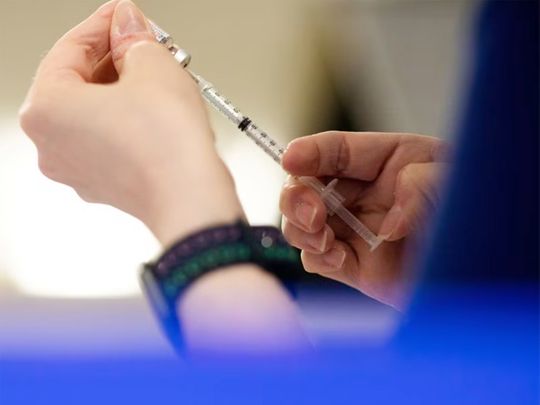
Dubai: The Kuwaiti Ministry of Health (MoH) has endorsed the requirements for individuals embarking on Hajj to Saudi Arabia.
With the 2024 Hajj season fast approaching, travellers for Hajj and Umrah must adhere to health protocols outlined by both Saudi and Kuwait health authorities.
Pilgrims are required to be vaccinated against meningitis (ACW135Y) and COVID-19 with vaccines approved by the Saudi Ministry of Health. Notably, all vaccines used in Kuwait are recognized by Saudi authorities.
The seasonal influenza vaccine is also mandatory, with a strong recommendation for high-risk groups such as the elderly, pregnant women, children under five, and those with chronic conditions.
Also read
- Umrah from UAE this Ramadan? 3 crucial things to know before you go!
- Saudi Arabia: Deadline for payment of second instalment of Hajj booking fees looms
- Saudi Arabia: Over a million converge on Mecca and Medina for final nights of Ramadan
- Saudi Arabia opens applications for seasonal jobs ahead of Hajj
Additionally, the pneumococcal vaccine (Pneumococcal 13 Valent) is required for those not previously vaccinated.
Pilgrims must adhere to preventive guidelines issued by Saudi health authorities during the Hajj to minimize health risks. These include maintaining hygiene, wearing masks in crowded areas, and using sanitizers.
A comprehensive medical examination is required for each pilgrim, which will be recorded on a health certificate issued by preventive health centers in Kuwait. This certificate must include detailed vaccination records and be stamped by authorized health officials.
Food handlers in Hajj caravans must undergo medical and laboratory exams to ensure they are free from infectious diseases.
Workers, including food handlers in Hajj caravans, must receive additional vaccinations such as the typhoid vaccine and tetanus shots according to specified intervals.
Health certificates are to be filled out carefully and any amendments must be officially re-certified by a doctor. Pilgrims’ health data is also recorded electronically for consistency and ease of access.
Individuals with conditions that severely limit physical capabilities are advised to postpone their pilgrimage. The same recommendation applies to children under five due to the risk of acute respiratory diseases.
Preventive centers are tasked with submitting weekly updates to the Infectious Diseases Control Department, which include statistics on vaccinated individuals and stock levels of vaccines.
Finally, pilgrims and their families are advised to follow health instructions to prevent the transmission of infectious diseases, including wearing masks, practicing good hygiene, and seeking medical attention if experiencing symptoms of respiratory illnesses.












